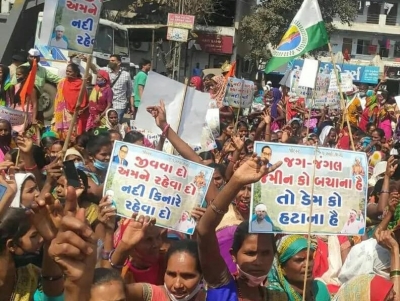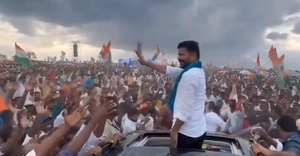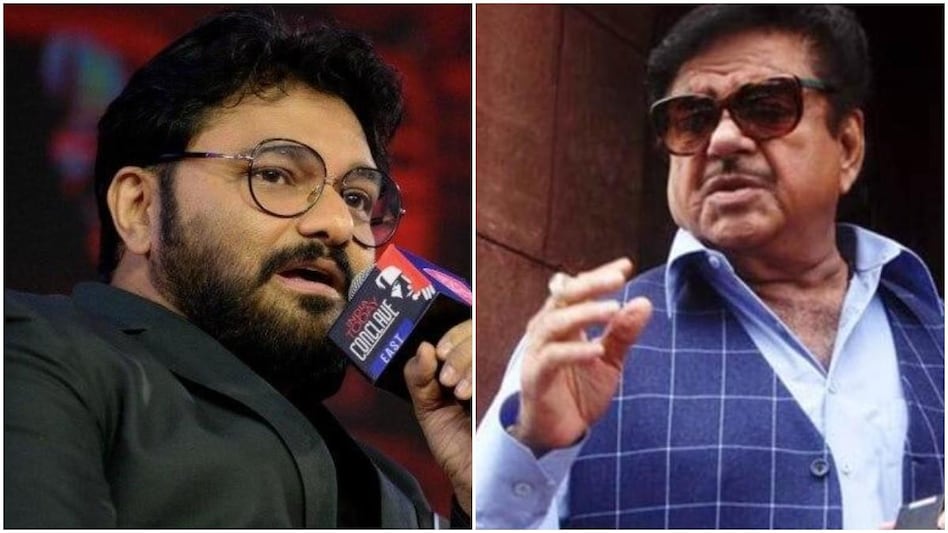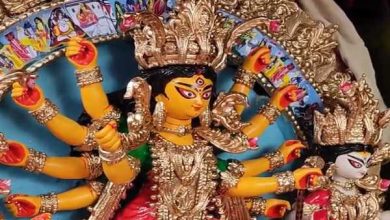Political parties trying to woo ‘game-changing’ tribals in poll-bound Gujarat

Gandhinagar, May 6 : With Gujarat, which has a sizeable proportion of tribal population (14.8 per cent), slated to go to the polls later this year, all political parties are making all out efforts to woo tribal voters.
The tribal voters can be the game-changers in Gujarat politics as of the 182-member House, 27 seats are reserved for them.
Even after 27 years of rule and almost three decades of grassroots work, the BJP has been unable to make major inroads into the Congress’ forte in the tribal belts. And the tribal voters, by and large, have remained loyal to the grand old party.
On April 21, Prime Minister Narendra Modi addressed the tribals in Dahod, while on May 1, Aam Aadmi Party national convener and Delhi Chief Minister Arvind Kejrival shared the stage with Bharatiya Tribal Party (BTP) leader Chhotu Vasava and addressed adivasis at Chanderia village in Valia Taluka.
Now, Congress leader Rahul Gandhi is slated to address the ‘Adivasi Satyagrah’ rally at Dahod on May 10.
To counter Rahul Gandhi’s rally, the BJP has organised its tribal cell national convention at the Statue of Unity from May 9 to 11, in which the party’s tribal cell office-bearers, leaders, MPs and MLAs from across the nation will participate.
Party sources said that in this convention, the saffron party may float an idea of projecting a tribal leader as President of the country and spread it in the tribal belts across the nation. In that case, the front-runner for BJP’s Presidential nominee will be senior tribal leader Anusuiya Uikey, currently serving as the Governor of Chhattisgarh.
The tribal belt in the state is spread on the eastern border of Gujarat from Danta in the north to Dangs in the south.
If one goes by the electoral history of the 27 reserved tribal seats, in 2012, Congress had won 15 seats, the BJP 10 while the JD(U) had won 2 seats. In 2017, Congress had again bagged 15 seats, followed by BJP (9), Bharatiya Tribal Party (2), while one seat was won by an Independent candidate.
Even after working for more than three decades in the tribal belt through sister concerns of RSS such as the Vanvasi Kalyan Parishad, Hindu Jagaran Manch and other organisations, and despite then BJP General Secretary Suryakant Acharya spending almost four years in the adivasi belt, the saffron party has not been able end Congress’ domination in the area.
Same is the story of BTP leader Chhotu Vasava and Dadra & Nagar Haveli MP late Mohan Delkar. Both tried to be tribal leaders of the entire belt, but failed. The root cause of the failure might be the strong sub-castes in tribals like Kotwaliyas in Banaskantha and Sabarkantha, Bhils in Dahod and Panchmahal, Rathwa in Chhotaudepur, Vasvas in Bharuch and Narmada districts, Chaudhary, Gamit, Dhodhiya in Surat and Tapi district, and Halpati, Nayakas, Kharva, Varli, Kumbhi and Kotwaliyas in Dangs, whose traditions are different.
Political parties have never allowed any tribal leader to rise above the sub-caste lines, so the community for decades has failed to produce one leader for the entire community, who could influence all the tribals, believes Ashok Chaudhary, social activist from Vyara in Tapi district.
One can also hold adivasis entirely responsible for this situation, as they never committed themselves to good, educated and quality leadership, Chaudhary claimed.
“Those days have gone when tribals used to blindly trust and vote for one party for decades. Now, we have educated people in the community. They do raise questions and change their loyalties like other communities, which is one reason why parties are compelled to give equal weightage and importance to tribals, a social activist said on condition of anonymity.
“There were days when development projects were completed without the consent of adivasis, that is why Ukai dam or the Narmada projects were completed. But now tribals are not ready to give up their rights, as they have realised that they have lost their livelihoods, land, forest and water. Their awareness level has increased due to which political parties are approaching them again and again, and not taking them for granted,” the activist added.





